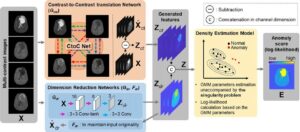Abstract
Anomaly detection in magnetic resonance imaging (MRI) is to distinguish the relevant biomarkers of diseases from those of normal tissues. In this paper, an unsupervised algorithm is proposed for pixel-level anomaly detection in multicontrast MRI. A deep neural network is developed, which uses only normal MR images as training data. The network has the two stages of feature generation and density estimation. For feature generation, relevant features are extracted from multicontrast MR images by performing contrast translation and dimension reduction. For density estimation, the distributions of the extracted features are estimated by using Gaussian mixture model (GMM). The two processes are trained to estimate normative distributions well presenting large normal datasets. In test phases, the proposed method can detect anomalies by measuring log-likelihood that a test sample belongs to the estimated normative distributions. The proposed method and its variants were applied to detect glioblastoma and ischemic stroke lesion. Comparison studies with six previous anomaly detection algorithms demonstrated that the proposed method achieved relevant improvements in quantitative and qualitative evaluations. Ablation studies by removing each module from the proposed framework validated the effectiveness of each proposed module. The proposed deep learning framework is an effective tool to detect anomalies in multicontrast MRI. The unsupervised approaches would have great potentials in detecting various lesions where annotated lesion data collection is limited.
